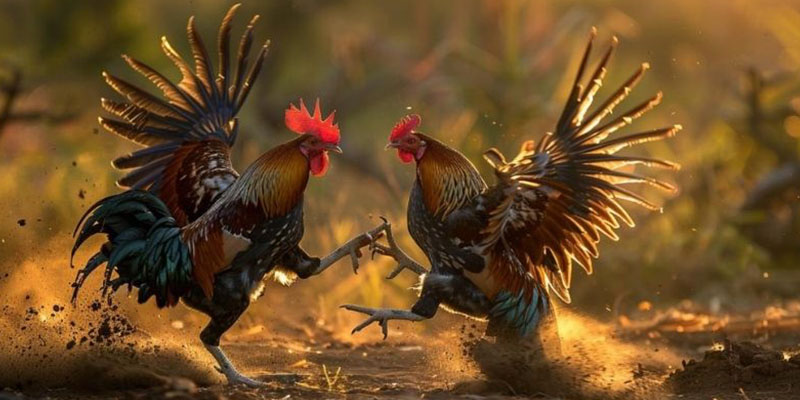
Cockfighting Regularly - The Secret to Improving Skills and Winning at the Top
Chicken training includes improving physical fitness, training fighting skills, increasing endurance and agility.
How to train chickens is not only a skill but also an art that needs to be cultivated and improved over time. For those who are passionate about raising chickens, training fighting cocks becomes an indispensable part of the process of caring for their pets. This article,sv388 will help you better understand effective training methods as well as the secrets to having a healthy and winning chicken.
Basic principles in chicken training
To begin your journey to raising a top-notch fighting cock, you must master the basic principles of chicken training. These principles apply not only to fighting cocks but to all other types of chickens.
Understanding the characteristics of chicken breeds
The first thing every chicken owner needs to do is understand the breed of chicken he or she is raising. Each breed has its own physical and psychological characteristics. Some breeds are known for their swimming ability and agility, while others have better endurance.
Each chicken will have a different personality, which can greatly affect the receptivity during the training process. You need to spend time observing and learning the characteristics of the chicken breed you raise to come up with the most appropriate training method.
Create the right training environment
The environment greatly affects the ability to train chickens. You should create a quiet, comfortable space so that the chicken can focus on the learning process. In addition, make sure that this location is spacious enough for the chicken to move and run around comfortably.
A little tip is that you can decorate this area with different objects to stimulate the chicken’s curiosity and desire to learn. This will help the chicken develop mentally and physically in the most comprehensive way.
Set clear training goals
Before you start training your chickens, you need to set specific goals. Maybe you want your chickens to achieve certain results in competitions, or simply improve their health and fitness.
These goals will not only guide you through your training, but will also help you track your chicken’s progress. Don’t forget to record each step so you can make appropriate adjustments to your training at each stage.
See also:79KING Sports
Effective training methods for chickens
Now that we have the basics down, let’s move on to specific and effective training methods for chickens. Each method has its own unique characteristics and serves different training needs.
Physical training for chickens
Physical strength is the leading factor that determines the fighting ability of fighting cocks. Therefore, you need to plan effective physical exercises.
Start with gentle exercises to get your chickens used to exercise. For example, you can let your chickens run around the yard or do simple kicking exercises. Then, gradually increase the difficulty of the exercises by having your chickens participate in more rigorous physical activities such as running longer distances, running long distances, or increasing the weight of the toys they use while they exercise.
In addition, nutrition is also an equally important part of helping to improve the health of chickens. Make sure that chickens are fed with all the necessary nutrients to support physical development.
Combat Skills Training
Fighting skills play an important role in a fighting cock. You will need to teach your cock basic attacking and defending techniques.
One of the most effective ways is through exposing the chicken to other chickens during training. However, attention must be paid to safety to avoid injury to the chicken.
In addition, you can use tools such as punching bags or foam sticks to train your chickens. With these exercises, your chicken will know how to react quickly when faced with unexpected situations.
Remember that training should be done slowly and patiently. Chickens also need time to learn and adapt to new techniques.
Enhance the psychology of chickens
Not only physical strength and skills, psychology is also a very necessary factor in the process of raising chickens. Chickens need to feel confident and comfortable in every situation they face.
Sounds such as music or the owner’s soft voice can be used to create a sense of familiarity for the chicken. These sounds will help the chicken calm down when under pressure during competition or when exposed to new elements.
Regular interaction with your chicken and building a close relationship will be the key to helping you build a strong spirit for your chicken.
Proper nutrition in chicken training
Nutrition is an important factor that cannot be ignored inhow to train chickenA healthy chicken needs a scientific, balanced diet for comprehensive development.
Essential food for chickens
To grow best, chickens need a varied diet. The main food is usually cereals such as rice, corn, soybeans and some green vegetables supplemented with vitamins.
Make sure your chickens get enough protein to stay healthy and strong. Fish and at least some animal products can be added to their diet to boost their protein intake.
You should also provide clean water and make sure that your chickens are always well hydrated to help promote their digestive health.
Reasonable meal time
Meal timing is also extremely important. There should be a specific feeding schedule for the chicken, helping it form scientific eating habits.
This not only helps the chickens get used to the time, but also makes it easier to control the amount of food they receive. You can divide the meals throughout the day instead of feeding the chickens at one large meal to avoid obesity.
Monitor eating
Regularly monitoring your chicken’s diet will help you detect health problems early. If you notice that your chicken is not eating well or has any unusual signs, review its diet or take it to the vet.
This is not just about supervision but also about showing responsibility and love for them.
Notes on how to train chickens
Progress how to train chickenIt is not always easy. There are issues that need to be taken into account to ensure the process goes smoothly and safely.
How to train chickens and important notes
Be patient during training
Always remember that each chicken will learn at a different rate. Some chickens will pick up skills quickly while others will take longer to adapt. This is completely normal.
Depending on the learning speed of the chicken, you can adjust the training method accordingly. Patience and skill from you will help the chicken feel more comfortable, thereby easily absorbing knowledge.
Avoid pressure
Stress is the biggest enemy in chicken training. If you feel that your chicken is uncomfortable during training or is being forced to do things beyond its ability, you should stop immediately.
A little rest, a nutritious meal or some playtime can help your chickens relieve stress and come back in a better mood.
Evaluate training progress periodically
Finally, you need to regularly evaluate your chicken’s training progress. Keep a record of what your chicken has learned, clearly demonstrate the results, and make appropriate adjustments as necessary.
Close monitoring will help you clearly see the positive changes as well as the weaknesses that need improvement for each chicken over a long period of time.
Frequently Asked Questions with Chicken Training
Is training fighting cocks different from training normal chickens?
Training fighting cocks often requires more investment of time and effort to develop their physical strength and fighting skills. While regular chickens only need basic care without too much technique.
When is the best time to start training chickens?
The time to start training chickens should be when they are adults, about 4-6 months old. At this time, the chickens have enough health and ability to learn to perform exercises.
Do I need supervision when training chickens?
Yes! You should supervise your chickens during training to ensure safety and optimal results. If you see any signs of fatigue or discomfort, give them a break immediately.
Do fighting cocks need special training before competing?
Yes! Gamecocks need a special training regimen to best prepare them for fights. This includes training in physical fitness, offensive and defensive skills, and mental game play.
Does nutrition affect training?
Absolutely! Nutrition is the key to healthy development and physical strength in chickens. A proper diet will greatly assist in the training process.
Conclude
Training chickens is not just a series of exercises but also a combination of love and responsibility of the owner for the fighting chickens.



